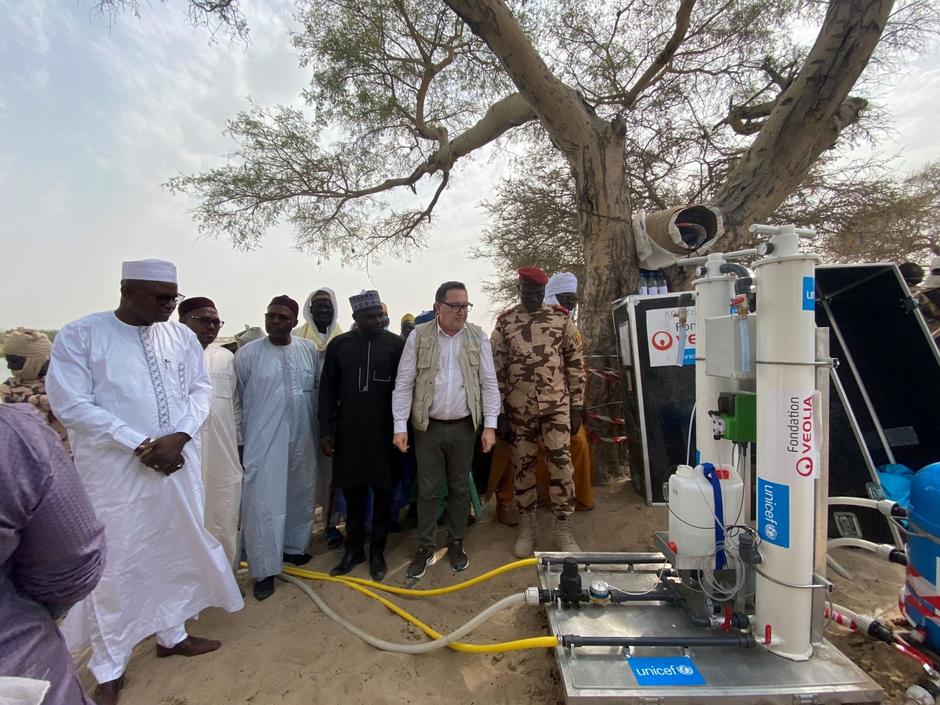At the heart of the African continent, Chad is the largest host country per capita in Africa. The latest UN estimates put the number of refugees in Chad at 1.1 million. Sudanese, Nigeriens and Cameroonians are added to the half-million internally displaced persons (IDPs) and returnees1. Access to essential services, and drinking water in particular, already under strain, is often compromised by the scarcity of resources.
It was against this backdrop that UNICEF asked the Veolia Foundation to identify water access solutions that were both adapted to this humanitarian environment and likely to be adopted by local communities.
Mobile water treatment units, Aquaforces 2000, designed by the Veolia Foundation, were entrusted to UNICEF for deployment in the field. This donation was accompanied by a skills sponsorship operation involving two Veoliaforce experts in the field. These Veolia employees, mobilized during their working hours to make themselves available to the Veolia Foundation, spent two weeks in Chad. The aim was to train local personnel in drinking water production and monitor the first deployment of the two Aquaforces 2000.
Pierre Rousseau (Veolia Water Technologies) and Adrien Vankemmel (Veolia Water), themselves trained by the Veolia Foundation in 2023, became trainers in their turn. "It was like diving into the deep end! With an added difficulty: the language barrier2, because among the twenty or so trainees, some spoke French, others Arabic, and others a dialect not always understood by their colleagues", explains Pierre Rousseau.
After a joint safety briefing with several UN agencies based in N'Djamena, the first step was to identify the sites where the two Aquaforces could be deployed. In Baga Sola and Bol, each located a few hours from N'Djamena, a freshwater source and adjoining land had to be found to install the water station.
Training evolved with the constraints of the audience. "Some learners, who are shopkeepers when they're not assigned to water production, weren't always available. We adapted the pace and adjusted the training. Because not everyone is equal when it comes to chemistry, for example. The Aquaforce 2000 is very easy to use, but there are still a few things that have to be done to ensure water quality", explains Adrien Vankemmel.
Once the theoretical training had been completed, the units were deployed as close as possible to the local population. "What you don't imagine before a mission like this is the importance of getting all the local community leaders on board, including religious leaders. These courtesies are essential if the water produced is simply to be drunk," noted Pierre Rousseau. "Acceptability is another major issue: if the water has a particular taste or color, you have to be able to justify and correct it. Otherwise, you'll have a hard time convincing people of the benefits of drinking this water rather than lake water."

Chad's Minister of Water and Sanitation, Kanabé Passalé Marcelin, came to see for himself the effectiveness of the Aquaforces, accompanied by Djibrine Ratou, Governor of the Lac province, and Jacques Boyer, UNICEF Chad Representative.
A few weeks later, the two Veoliaforce experts had returned to their daily lives, but in the two communities of Baga Sola (5,603 people) and Bol (7,1905 people) hosting IDPs, drinking water is now flowing.

Why 2000?
An Aquaforce 2000 provides 15 to 20 liters of drinking water per person per day for a population of 2,000.
A partnership with UNICEF since 2008
In 2008, the Veolia Foundation became a UNICEF Standby Partner. What does this mean? It's a status that makes the Veolia Foundation a privileged partner of the UN agency in charge of water access issues. Nearly twenty missions have been carried out within this partnership framework, most often to provide cutting-edge technical expertise. For example, in Lebanon after the deadly explosion of August 2020, to investigate leaks in the water network. Or in Equatorial Guinea in 2021, to sample micropollutants and detect water contamination.
---
1 Source : https://news.un.org/fr/story/2024/03/1143642
2 The official languages of Chad are Arabic and French, and over a hundred languages are spoken in the country, which is home to more than 200 different ethnic groups.






